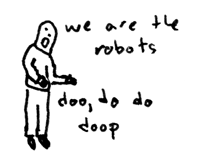| Monday, September 1, 2003 |
| Things become easier |
| I'm trying to find my way through the maze of paperwork needed to stay in France. And I have help, so maybe I need to change my mind about how difficult it is supposed to be. My new friend Leyla is dragging me around to government offices and doing most of the talking for me. She thinks it is easy, and that civil servants are there to help you. She is a lawyer, at least almost, and she just became a French citizen herself. Right now we're working on how we can have health coverage, without actually paying for it, which we need to get the residence permit (Carte de Sejour). There are various hurdles to go through, but people are friendly, and indeed it seems like things aren't all that much of a problem. And some new rules in various areas seem to have made things easier. That would be a nice change. Imagine that, government employees who actually are there to help you, and who care about finding the best solution for you. I somehow didn't expect that.
And today a company called me from Costa Rica out of the blue, wanting to hire me. They sort of randomly found my resume on the net in a search engine. And, despite that that resume is sort of arrogant, and kind of hinting that if they want to offer me a regular job, they can go jump in a lake - they wanted me to move to Costa Rica to work for them. That's a beautiful place, I'm sure, and I'd love to visit, but I'd really like to get this France thing worked out at this point. So hopefully I can work out something else with them. If not, it is at least a good sign. [ Diary | 2003-09-01 17:03 | 4 comments | PermaLink ] More > |
| The secret of emperors |
 A fairy tale from Max about traveling emperors. A fairy tale from Max about traveling emperors.Then, a while later, in the far, far, away country, the silent voice talked to him again: "my son, so far, so good. But there is a secret you apparently are not quite aware of. If you want to feel true power and nothing but true power, you must start with nothing, absolutely nothing! This is the deepest of the secrets of all Emperors. So, if you don't mind, I'll arrange that you lose your remaining funds and income from the old new world while being back in the new old world. Just leave it up to me!"Alas, knowing the secret of emperors doesn't always make it easier. Sometimes a little magic would be nice. [ Inspiration | 2003-09-01 17:03 | 3 comments | PermaLink ] More > |
| Robot economies |
 A fellow named Marshall Brain wrote a couple of interesting articles, Robotic Nation and Robotic Freedom. Essentially he points out that it is pretty inevitable that in a few years a lot of jobs will be done by robots. Particularly minimum wage low level jobs, like clerks at Walmart, the people at the counter at McDonalds, etc. So, a lot of people will become unemployed, because their jobs can be done without humans, or with much fewer humans. But the people who own those companies will make the same or more money. Wealth gets amassed into fewer hands and large masses of people will have no chance of playing in that game. And the author then tries to come up with some creative scenarios of how wealth might become more distributed. A fellow named Marshall Brain wrote a couple of interesting articles, Robotic Nation and Robotic Freedom. Essentially he points out that it is pretty inevitable that in a few years a lot of jobs will be done by robots. Particularly minimum wage low level jobs, like clerks at Walmart, the people at the counter at McDonalds, etc. So, a lot of people will become unemployed, because their jobs can be done without humans, or with much fewer humans. But the people who own those companies will make the same or more money. Wealth gets amassed into fewer hands and large masses of people will have no chance of playing in that game. And the author then tries to come up with some creative scenarios of how wealth might become more distributed.
Many good points in those articles, and some good ideas too, although probably not all workable. I'd insist that there are some fundamental problems in our economic system which would need to be solved, and which won't be solved by creative ways of paying people money so they can keep being consumers. The current system is rigged towards amassing money for large corporations and banks, and little sub-schemes aren't going to change that. The robot problem indeed points out some of those design flaws in the system. Indeed, if a piece of work could be done well by robots instead of humans for 1/2 the price, few corporations will hesitate to make that choice. So, take that a bit further and imagine that at some point most work could suddenly be done by robots. The "rational" decisions for a board of directors, if there's a cheaper and more efficient alternative, will be to fire everybody, except for a few managers or designers or whatever would still be needed. Taken to its full conclusion, we end up with just managers, board members, business owners, investors, and we don't need everybody else. Automated factories can ultimately produce everything, and smart robots can do all manual work. But hey, where's then the future we were promised? If most things end up being done by automation, we'd expect to be able to live lives of leisure, pursuing purely artistic or philosophic endeavors. Growing orchids, painting, traveling, studying ancient languages. If machines could produce in abundance everything we need, there would be no great reason why we shouldn't. Then why isn't it going in that direction? Despite announcements of us living in an information economy, we're really still living in an economic system designed for the industrial revolution, meant to centralize the production power, and the capital needed to finance it. Under such a system, ubiquitous automation would mean that almost everybody's unemployed and that the owners of the production apparatus would be incredibly wealthy. That is not going to happen, just for the reason that the capitalistic system doesn't work without most of us being consumers. I.e. we need to be able to pay for whatever is produced. The wealthy corporate owners enjoy being very wealthy, but they know full well that it in their best interest to keep most other people in a state of being affluent enough to buy the products that are being produced, but stupid enough to not be able to threaten their position. So they would naturally look towards inventing some more useless jobs to replace the jobs that are automated. Probably they won't create those jobs themselves, but they might persuade a government to increase its budget or start a war or something. Or they might think of ways of making life more complicated so that some new kinds of professions are needed to sort it out. There's also the entirely more optimistic possibility that the new technology will become inherently liberating for everybody. Just like the Internet tends to flatten out hierarchies and give equal possibilities to a much wider group of people. Robotics, artificial intelligence and nanotech might possibly do that too. There's indeed a trend towards putting the means of production more into the hands of regular people. It won't be all that long before you can have a "printer" in your house which can "print" things that are actually useful. Right now you can buy such a thing for making prototypes, and it will make plastic models of computer design, and it has dropped drastically in price over the last few years. Just like desktop publishing revolutionized publishing, desktop manufacturing will too. Potentially the advantage of huge centralized production facilities will disappear for many purposes. You might be able to produce things just as cheaply in your kitchen. Or maybe, as with desktop publishing and website design, even cheaper on your own than if it were done by a huge corporation. And maybe, along with all that change, somebody will come up with a new economic system that actually is good enough that it sticks. A system where it actually is a good thing for everybody if something can be produced more efficiently, rather than an unemployment headache. [ Organization | 2003-09-01 17:03 | 10 comments | PermaLink ] More > |